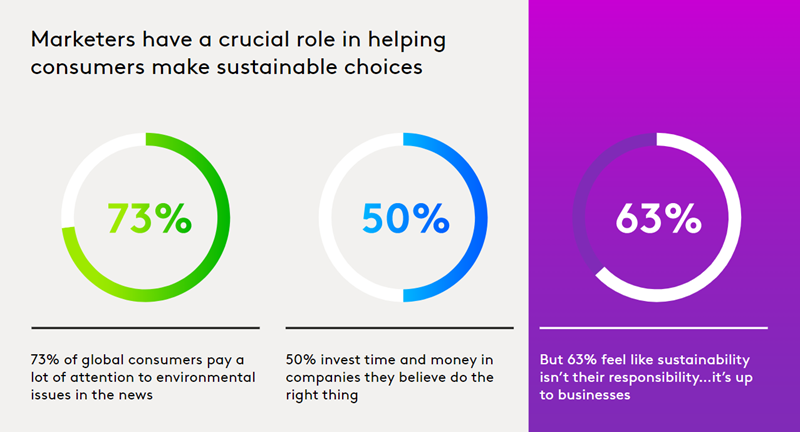Ahead of this year’s Earth Day on 22 April, we are being asked to ‘invest in our planet’. The organisers of the annual climate action event state: “We need to act (boldly), innovate (broadly), and implement (equitably). It’s going to take all of us.” With this in mind, what is the role of business – and more specifically, the role of marketing - in effecting the change that the planet and human society need to see?
Kantar’s consumer trends tracker Global MONITOR shows that people blame business for society’s environmental challenges: 79% of people globally hold large corporates responsible. And so, when companies look to take action, they’re faced by skepticism: 63% of people across the world are cynical about the motivations of brands in this space according to our Sustainability Sector Index.
We know that people want to see change, with over half (58%) globally paying attention to social and environmental issues and 50% investing time and money in companies they believe do the right thing. But the majority of consumers (63%) don’t feel like it’s down to them to clean up the mess. (Sustainability Sector Index). So, who should be leading the transformation?

The UN has said that systemic economic transformation cannot be achieved without the private sector. And businesses agree – virtually all of the CEOs of the world’s largest corporations say in the UN Global Compact/Accenture annual CEO survey that sustainability is “critical to their companies’ future success”. Why is that? It is at least partly because in this era of disruption, if businesses don’t change, they’ll “fail to exist”, according to Mark Carney, United Nations special envoy for climate action and finance.
Communicating a sustainable world
It has been argued with strong justification that marketing has historically had a role in amplifying the negative impacts of products and services. But the UN has acknowledged the central role of communications in making sustainable consumption a reality. Marketing has the singular power and skills to ignite the transition that businesses recognise is now needed. This is how Nigel Topping, the UK High Level Climate Action champion, frames it: “Marketing has incredible power in creating exciting and tangible visions of ourselves and our future, and in explaining the benefits of this critical transition to a zero-carbon world. Given how important climate change is to their business and to our planet, CMOs should quickly become the new climate activists and lead the way in the Race to Zero.”
To some extent, this is already happening. We all know Dove as a brand which champions female empowerment and has done for some 20 years now. But it has also evolved over time; from being more product and function-led to focussing on its brand identity, emotional benefits and social purpose more recently.
Upping the ambition
But we have to be much more ambitious, particularly in the light of the dire warnings in the most recent IPCC report. But also because we are in the middle of a fundamental generational shift the likes of which we’ve only seen once before in the last 120 years. The first came after the Second World War, triggering the shift from institutionalism to individualism, driven by the Boomer generation and capitalised upon by brands like Levi’s and Harley Davidson. This latest shift will be marked by a turning away from individualism toward community, driven by GenZ which is in population terms the biggest cohort of consumers we’ve ever seen. This group, now entering and taking control of the marketplace, is looking for brands that embrace this new mindset and sensibility.
The biggest consumer challenge they and businesses are facing now is to close the Value-Action Gap, the gap between people’s stated values and beliefs and their ability to act in line with those values: “the Holy Grail,” according to the UN. Look at the UK as an example; to hit the country’s legal obligations, 59% of the required 78% reduction in carbon emissions will need to incorporate some level of behaviour change.
88% of UK consumers are actively looking to brands to help them align their actions with their values (Sustainability Sector Index). And Kantar’s behavioural science work tells us what their barriers to sustainable consumption are, and therefore how to close the gap. What we see is that it’s about awareness, availability, convenience, price and its relationship with perceived quality, individual responsibility and the personal impact people feel they can make. We can map these frictions across the consumer experience journey and zoom in on how to unlock them. A variety of marketing levers – communications, innovation and partnerships - can be used to effect change.
For a long time now, marketing has been cast as the villain of the story – we now have the opportunity to use our skills for good and drive the sustainable transformation that the earth needs to see.


